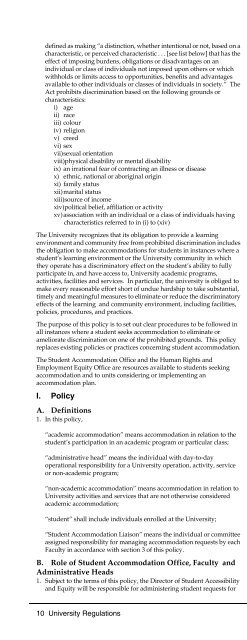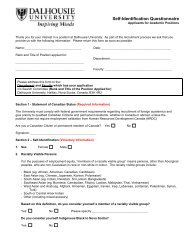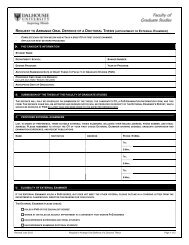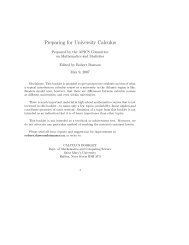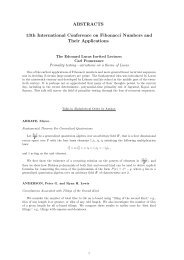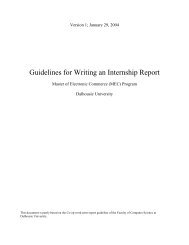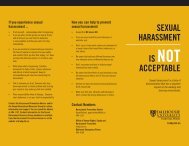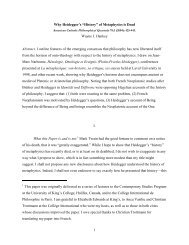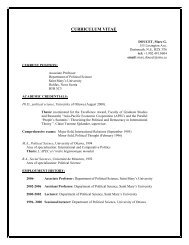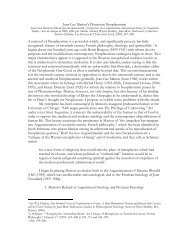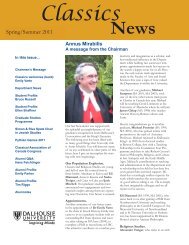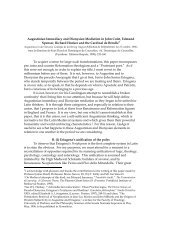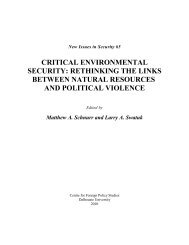Smoke Free/Scent Free Dalhousie - Dalhousie University
Smoke Free/Scent Free Dalhousie - Dalhousie University
Smoke Free/Scent Free Dalhousie - Dalhousie University
You also want an ePaper? Increase the reach of your titles
YUMPU automatically turns print PDFs into web optimized ePapers that Google loves.
defined as making “a distinction, whether intentional or not, based on a<br />
characteristic, or perceived characteristic . . . [see list below] that has the<br />
effect of imposing burdens, obligations or disadvantages on an<br />
individual or class of individuals not imposed upon others or which<br />
withholds or limits access to opportunities, benefits and advantages<br />
available to other individuals or classes of individuals in society.” The<br />
Act prohibits discrimination based on the following grounds or<br />
characteristics:<br />
i) age<br />
ii) race<br />
iii) colour<br />
iv) religion<br />
v) creed<br />
vi) sex<br />
vii)sexual orientation<br />
viii)physical disability or mental disability<br />
ix) an irrational fear of contracting an illness or disease<br />
x) ethnic, national or aboriginal origin<br />
xi) family status<br />
xii)marital status<br />
xiii)source of income<br />
xiv)political belief, affiliation or activity<br />
xv)association with an individual or a class of individuals having<br />
characteristics referred to in (i) to (xiv)<br />
The <strong>University</strong> recognizes that its obligation to provide a learning<br />
environment and community free from prohibited discrimination includes<br />
the obligation to make accommodations for students in instances where a<br />
student’s learning environment or the <strong>University</strong> community in which<br />
they operate has a discriminatory effect on the student’s ability to fully<br />
participate in, and have access to, <strong>University</strong> academic programs,<br />
activities, facilities and services. In particular, the university is obliged to<br />
make every reasonable effort short of undue hardship to take substantial,<br />
timely and meaningful measures to eliminate or reduce the discriminatory<br />
effects of the learning and community environment, including facilities,<br />
policies, procedures, and practices.<br />
The purpose of this policy is to set out clear procedures to be followed in<br />
all instances where a student seeks accommodation to eliminate or<br />
ameliorate discrimination on one of the prohibited grounds. This policy<br />
replaces existing policies or practices concerning student accommodation.<br />
The Student Accommodation Office and the Human Rights and<br />
Employment Equity Office are resources available to students seeking<br />
accommodation and to units considering or implementing an<br />
accommodation plan.<br />
I. Policy<br />
A. Definitions<br />
1. In this policy,<br />
“academic accommodation” means accommodation in relation to the<br />
student’s participation in an academic program or particular class;<br />
“administrative head” means the individual with day-to-day<br />
operational responsibility for a <strong>University</strong> operation, activity, service<br />
or non-academic program;<br />
“non-academic accommodation” means accommodation in relation to<br />
<strong>University</strong> activities and services that are not otherwise considered<br />
academic accommodation;<br />
“student” shall include individuals enrolled at the <strong>University</strong>;<br />
“Student Accommodation Liaison” means the individual or committee<br />
assigned responsibility for managing accommodation requests by each<br />
Faculty in accordance with section 3 of this policy.<br />
B. Role of Student Accommodation Office, Faculty and<br />
Administrative Heads<br />
1. Subject to the terms of this policy, the Director of Student Accessibility<br />
and Equity will be responsible for administering student requests for<br />
10 <strong>University</strong> Regulations<br />
accommodation, in consultation with the Faculty’s Student<br />
Accommodation Liaison in relation to academic accommodation, and<br />
in consultation with the relevant administrative head in relation to<br />
non-academic accommodation.<br />
2. Each Faculty shall either assign a senior academic administrator or a<br />
Faculty, School or Department committee the responsibility to act on<br />
behalf of the Faculty in relation to academic accommodation requests<br />
under this Policy. Such individuals or committee shall be referred to<br />
in this policy as the Student Accommodation Liaison.<br />
3. Prior to the commencement of each academic year, the Student<br />
Accommodation Liaison shall be responsible for approving parameters<br />
for academic accommodations relative to the Faculty’s particular<br />
academic program and class requirements.<br />
C. Requests for accommodation<br />
1. It is the student’s responsibility to make a request for accommodation<br />
in accordance with this policy. The request for accommodation must<br />
be made reasonably in advance of the event or process in relation to<br />
which accommodation is being sought so that a decision can be made.<br />
Except in rare circumstances when significant psychological or mental<br />
health issues arise, there should be no “after-the-fact” accommodation.<br />
The <strong>University</strong> will consider a request for accommodation made by a<br />
third party (physician, family member, caregiver, advocate or other<br />
representative) only where the student has provided prior written<br />
consent.<br />
2. A request for accommodation shall be made by the student in writing<br />
to the Student Accommodation Office, and shall contain the following<br />
information:<br />
a) the reasons for the accommodation (i.e. particulars of the<br />
discriminatory impact on the student on one of the prohibited grounds)<br />
and any supporting documentation;<br />
b) the accommodation being requested and/or any suggestions as to<br />
how the accommodation can be achieved;<br />
c) where a medical condition is relevant to the request, copies of<br />
medical reports or additional medical documentation to<br />
substantiate the request and/or to assist in identifying the most<br />
appropriate means of accommodation; and<br />
d) where the request relates to academic accommodation in relation to<br />
a learning disability, a current psycho-educational report describing<br />
the nature of the learning disability.<br />
D. Assessment and Decisions concerning accommodation<br />
1. The assessment by the Student Accommodation Office is a two-step<br />
process. First, the Student Accommodation Office screens the requests<br />
to ensure that only requests arising in relation to one of the prohibited<br />
grounds of discrimination are permitted to proceed. If the request does<br />
arise in relation to one of the prohibited grounds, the Student<br />
Accommodation Office shall proceed to the second step, and shall<br />
consider all relevant factors in making a preliminary assessment as to<br />
whether an accommodation could be made without imposing an<br />
undue hardship to the <strong>University</strong>. In making such an assessment, the<br />
Student Accommodation Office will usually consult with the student<br />
making the request. Relevant factors include, but are not limited to, the<br />
following:<br />
a) Linkage – whether the proposed accommodation will have the<br />
practical effect of eliminating or reducing the identified barrier;<br />
b) Safety – whether the proposed accommodation would pose a safety<br />
risk to faculty, staff or other students or to the student seeking<br />
accommodation;<br />
c) Financial Cost – what are the costs (estimate out-of-pocket expenses<br />
to put the accommodation in place together with any long-term<br />
costs to sustain the proposed accommodation), and would such<br />
costs be prohibitive;<br />
d) Size and nature of the program or service – how disruptive would<br />
the proposed accommodation be to the program or service,<br />
considering the number of students, faculty and staff and the nature<br />
and inter-relationships of their roles;


